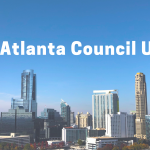Buckhead Cityhood Movement
The idea of Buckhead cityhood has been discussed in the past, but the idea is closer to a real possibility than ever before. The process to allow Buckhead residents to vote on leaving the City of Atlanta and becoming an independent municipality is underway in the Georgia General Assembly.
The road to Buckhead cityhood is long and the reasons driving it are complex. Neighbor Newspapers has answered some of the frequently asked questions regarding Buckhead cityhood.
How does a region become a city?
De-annexation of a major city has never been done before in Georgia. For Buckhead to be carved out of Atlanta and molded into its own city, two separate bills must be introduced — one to de-annex or secede from the existing city and the other to create the new city. The de-annexation bill requires the support of the local legislative delegation from the city or county impacted. The cityhood bill requires a feasibility study to be done to determine if cityhood is viable.
If the local delegation, the House and the Senate determine that both bills should be passed, the bills move to Gov. Brian Kemp to either sign or veto. if signed, a referendum would be placed on the ballot, allowing only voters in the selected area of Buckhead to choose whether they would like their community to form a new city. Atlanta resident outside of Buckhead would not be able to vote.
Why do some residents want to start Buckhead City?
The most notable reason residents are pushing for cityhood is the rise in crime in Buckhead. According to an Atlanta Police Department crime report, Zone 2 — Buckhead, West Midtown, Lenox Park and Piedmont Heights — saw a 46% increase in aggravated assaults since last September. Auto larcenies and theft have also increased 16%.
In addition to crime rates increasing, residents also cite zoning issues, taxation and neglected infrastructure as reasons to separate from Atlanta.
Who are the key supporters?
The Buckhead City Committee, formerly known as the Buckhead Exploratory Committee, has been one of the loudest voices for Buckhead becoming Buckhead City. According to the committee’s website, the committee is a nonpartisan group comprised of residents who want the best for Buckhead.
Committee President and CEO Bill White, former head of the Intrepid Sea-Air-Space Museum, says that in the three years he has lived in Buckhead he has seen the quality of life decrease dramatically.
“The Buckhead City movement seeks to gain more influence for Buckhead residents only over the areas of public safety, parks, zoning, and road maintenance – functions the City of Atlanta has failed to satisfy for years,” White said.
The Buckhead City Committee also released a feasibility study conducted by Valdosta State University Center for South Georgia Regional Impact. According to the study, the proposed Buckhead City should expect annual revenue of approximately $203 million and annual expenses of around $90 million, generating a surplus of around $113 million.
The study also states the proposed Buckhead City would continue to utilize —and fund through taxes and fees — the Atlanta Public Schools, city services like water supply and trash collection, and Fulton County libraries.
White and other supporters held a press conference early Sept. 29 at Loudermilk Park, where several supporters of Buckhead City came together to announce Buckhead cityhood would be discussed during a special session of the Georgia General Assembly.
Several co-sponsors to the Buckhead City bill also announced their support, including Sen. Burt Jones (District 25); Sen. Greg Dolezal (District 27); and Sen. Randy Robertson (District 29). Others pledged to sign the bill include Sen. Lee Anderson (District 24); Sen. Steve Gooch (District 51); Sen. Carden Summers (District 13); Sen. Chuck Payne (District 54); Sen. Matt Brass (District 28); Sen. Marty Harbin (District 16); and Sen. Tyler Harper (District 7).
Sen. Clint Dixon (District 45), Kemp’s floor leader and member of the Georgia State and Local Government Operations Committee, signed the bill last month.
“Those involved in the Buckhead City movement love Atlanta, and we’re certain that this incorporation will make the entire metropolitan region safer and more prosperous,” White said.
What is Buckhead City Committee proposing?
According to the Buckhead City Committee, Buckhead City would have its own police department. The feasibility study claims the starting salary for a Buckhead City patrol officer to be $55,000. The starting salary at the Atlanta Police Department is $48,500 and the committee has a stated goal of offering up to $70,000. Using an FBI recommendation of 2.5 officers per 1,000 residents, the study projects 250 Buckhead City police officers, 175 of them patrol officers.
Buckhead City would have its own mayor, city council, city administration, fire department, municipal courts, parks department, public works department, etc. According to the feasibility study, assumed expenditures are comparable to the Atlanta-area cities of Roswell and Sandy Springs.
Buckhead City would continue to utilize — and fund through taxes and fees — the Atlanta Public Schools, city services like water supply and trash collection, and Fulton County libraries.
Buckhead City Committee also aims to gain control over local zoning, greater accountability of taxes and maintaining and fixing infrastructure issues, such as roads and parks.
Who are the key opponents?
The Buckhead Coalition and Committee for a United Atlanta are two of the primary voices against Buckhead cityhood.
Founded in 1988, the Buckhead Coalition was created with the mission of “nurturing the quality of life in Buckhead and improving the community as an integral part of the City of Atlanta.” Former Mayor Sam Massell served as President of the Buckhead Coalition from its creation until his retirement in 2020.
“The need to address the crime wave is urgent, as well as the quality of municipal services we receive, but the solution to these and other problems and concerns is to come out and vote in the November election, not to carve yourself out of the city,” Buckhead Coalition President Jim Durrett said. “This would create more problems that it purports to solve.”
Head of Dentons Georgia Public Policy Team and acting chair of the Committee for a United Atlanta Edward Lindsey understands the sentiment behind seceding from Atlanta, but doesn’t believe that becoming its own city will solve the problems.
“We believe that the best way to deal with this issue is to focus on getting strong leadership at City Hall through the mayoral elections in November,” Lindsey said. “The focus for people of Buckhead as well, the entire city of Atlanta, needs to be on those elections, to make sure that we put into office through the ballot box.”
“Criminals are not going to respect us a new city limits line,” Lindsey said. “They’re going to go where the money is. If you look at other suburban cities surrounding Atlanta, you will also see a spike in crime in those areas. So, like I said, this isn’t a problem that’s unique to Buckhead, or even even to the city of Atlanta. But we do need strong new leadership that takes the issue of crime seriously and addresses those concerns.”
The Committee for a United Atlanta was formed by residents “to communicate and educate on the dangers of the attempt by some to separate selected portions of Buckhead from the City of Atlanta” and recently released its own study on the affects of Buckhead cityhood.
According to the study, the annual net fiscal loss to the city of Atlanta would range from $80 million to $116 million. For Atlanta Public Schools, the school district would be substantially depleted, with an estimated $232 million loss annually.
The study also addresses the issues surrounding service of current debt and future debt, economic development disunity, and reduced community services. The study claims are all likely to be significant difficulties for the city of Atlanta, Atlanta Public Schools and the Buckhead area if a de-annexation would move forward. Each would stand to lose financially, economically and socially.
What happens next?
Alpharetta Republican State Sen. Brandon Beach prefiled legislation on Thursday that will jump-start a battle over Buckhead cityhood next session.
The bill, SB 324, would let residents in the wealthy area decide whether or not they want to secede from the city of Atlanta and create their own. If it passes, the question would be added to the ballot next November for Buckhead for a vote.
Neither Beach nor any of his 12 Republican co-sponsors actually represent Buckhead.





